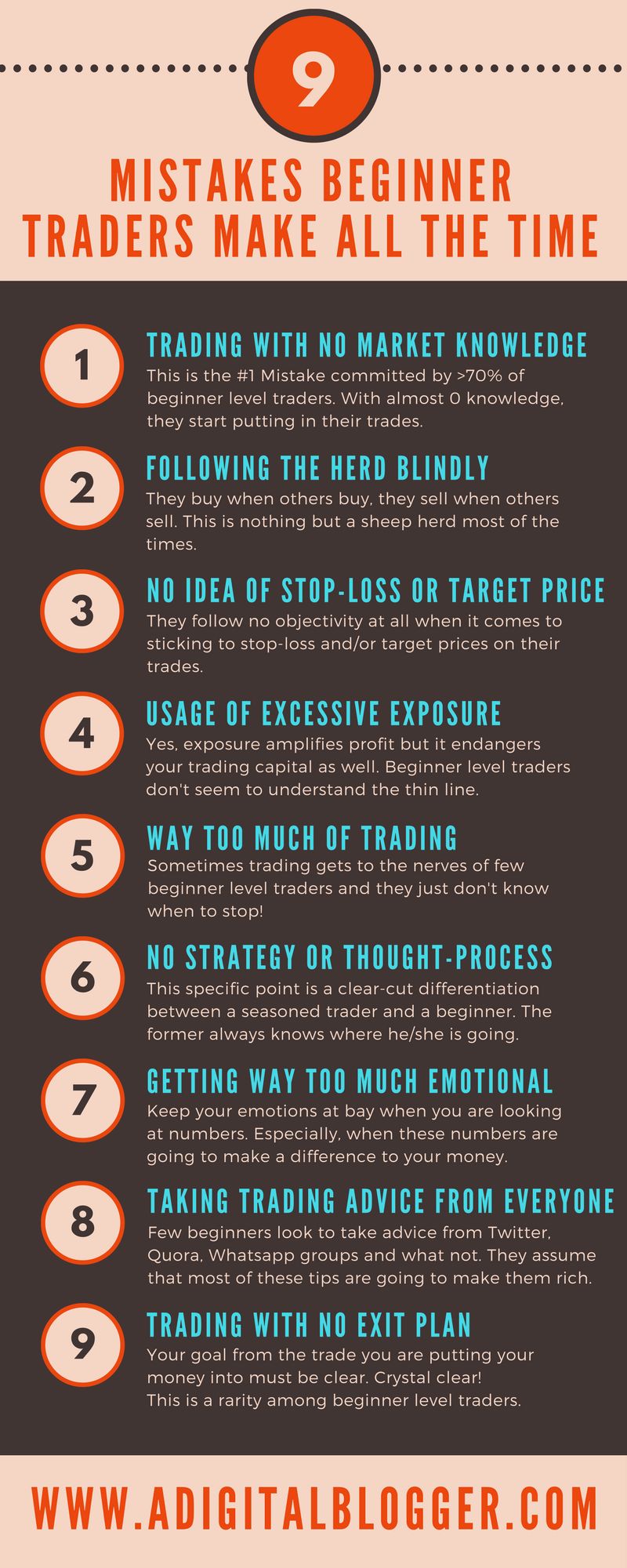Check All Frequently Asked Questions
Trading in the stock market is exciting! Ain’t it? Well, at the same time, it requires you to keep a cool and composed head otherwise numbers can get overwhelming – which is not a good sign for a trader.
Here we are going to talk about some of the most common trading mistakes committed by traders, especially by the ones who have recently entered into the stockbroking space. If you make sure not to commit these mistakes in your trades, then you will always be looking at smart investments.
9 Most Common Beginner Trading Mistakes
Believe it or not, most of the beginner traders think that trading is some sort of Harry Potter’s wand and they are going to be a rich person very soon. And while chasing that thought, they commit a lot of mistakes which eventually results in reasonable losses.
With consistent losses, one day or the other, such traders lose their interest and think that trading is not that magical after all.
Anyway, let’s talk about these Trading Mistakes one by one and see whether you are, knowingly or unknowingly, committing these mistakes are not.
1. Trading with Zero Market Knowledge
This is the number 1 trading mistake that more than 70% of beginners traders commit on a frequent basis. They enter into the trading space with dreams of making millions within a few months of entering the stock market.
Imagine this, you recently completed your higher secondary studies and have just entered into the first few days of your engineering college.
Would you be in a spot to design and develop a robot that throws a basketball in a specific direction? Or maybe design a computer programme that stores a user’s Google encrypted data into a specific password-protected file?
No, right!
Likewise, if you have entered into the stock market space and are aspiring to turn yourself into a millionaire in a few days, that is highly unlikely to happen.
You may choose to learn the art of trade by subscribing to an online trading education course that enables you to take your own trading decisions or read some recommended stock market books or subscribe on an advisory service.
Whatever you may choose, it’s recommended that you prepare yourself or take professional outside help before placing your hard-earned money in the stock market.
Because if you don’t, then you stand a high chance of losing out on that money anyway.
2. Blindly Following What Other Traders are Doing
“What is that? Is that a Cobra snake?” a young man pointed at a tree branch and said.
“Is it?” said a passer-by.
“Oh, look! there is a snake in the trees.” said another motorcyclist.
This lead to 50+ people pointing at a tree which had nothing but a small squirrel running among branches.
Observing a similar trend in the stock market is not a rarity either.
Traders, especially beginner level ones, like to follow the market trends with almost no understanding of what is happening, why is it happening and till when is this going to continue.
The result is – either such traders end up paying up way too much for stocks that could have been bought at a much smaller price. Further, they exit way too late to make any reasonable profit of such trades either.
The experienced traders on that other hand move out of the trade trend at the right time when it is getting over-crowded by the beginner traders and there is not much left in the trade either.
3. Failure to stick to Stop Loss and Target Price Amounts
Suppose you bought 100 stocks of a 20-year-old company – ADB Pharma at ₹250 each.
Now, on day 2, let’s say a rumour fled in the market saying license of ABD pharma is going to be cancelled due to some lapses in the last 6 months over few medicines.
The “rumour” spreads like fire but, its a rumour and there was no official confirmation from any of the party involved.
The stock value has gone rapidly done and is currently being traded at ₹175 per share. The stock saw this kind of valuation 5 years back.
What will you do?
Now, this is where experience helps! Or may learn not to panic in sudden market reactions.
A lot of users would look to exit out of their positions taking a decent hit on their investments.
They do not have a number in the mind that gives them a threshold point on when to exit. Such a point is called ‘Stop-Loss‘ which expert traders always put on their trades and STICK to them.
Few will decide to stay with their shares due to 2 reasons: One, they do not know how to react: two, they anticipate the rumour to be false and think that the stock will regain back in sometime.
While a few rare will actually buy these shares at a much lesser rate. The reason for them is simple – since the news is yet unconfirmed, they will not get another chance in the near future to buy this stock at such price. Yea, there is a risk but it comes with a potential reward as well.
Similarly, if there were a positive rumour, something like – ADB pharma received a tax benefit on manufacturing from the state government, then the stock value must have peaked.
At that point in time, you would need to find a ‘Target price’ at which you would like to get out of your position after gaining a reasonable profit on the trade.
These are important metrics and you are supposed to stay with them if you really want to maximize your profits and minimize your losses.
4. Usage of Excessive Exposure
Exposure or some people call it leverage or margin trading, is a double-edged sword. We have mentioned it multiple times in our other article pieces and videos that DO NOT use leverage if you don’t know how to.
Because, if you use it and you actually do not understand its implications and risks then you better pack yourself and get ready for a sizable loss very soon.
We get a lot of queries from beginner level traders (especially students) who want to open a Demat account with a broker that provides high exposure with a low brokerage rate. When we ask how do they plan to use exposure? 90% of the times the answer is that they want to amplify their profits.
One thing, they obviously miss out on, is that as the profits, the losses will also be amplified that will not only wipe their trading capital but also put them in a debt position that will invariably take them months to reach back to zero.
Beginner traders get excited by looking at one side of the coin only which looks glorified by certainly comes with its own perils.
That’s the harsh reality that beginners need to understand very clearly. Exposure is risky. Period!
5. Trading Way too much
You know what Einstein used to do when he wanted to relax?
He played the Violin!
Not only for himself, but he also used to actually play socially at local recitals or joined in impromptu groups such as Christmas carolers who stopped at his home. With such small distractions, he came back to his experiments with much more focus and energy.
Same goes for everything else in life. Even if you are a professional trader, you cannot (and must not) trade too much.
If you are trading for a secondary income, then the point becomes even more applicable to you that the trades you place must be in line with your investment goals.
You must not be excruciating or overwhelming yourself with the kind and number of trades you place in the stock market.
There must be a specific goal in your head in terms of a specific profitable or losing position. Make sure you do not stretch yourself from this range otherwise it will only worsen your trade position overall.
However, this is one common mistake beginner traders find themselves coming most of the times.
6. Trading without any Strategy or thought-process
An experienced trader will always have a clear-cut idea on what his/her investment goals are, what are the return expectations, what loss he/she can accommodate at that point in time, what are the exact entry and exit points of each of the trades they place, what time period are they going to stay in a specific position and so on.
All these thought processes, ideas, strategies are something an experienced trader gets naturally.
Imagine yourself getting a surprise test in your class with no knowledge of the subject and the difficulty level.
You can relate this to something a beginner trader generally does in the trades he/she places. Such trades are generally of short duration with the exit decision coming as soon as there is some decline observed in the bought stock(s).
The worst part is, that each one of such traders is expecting a miracle to happen, thinking that the stock market is going to run in such a way that benefits his or her trading decisions.
Sometimes, they stay stuck with a losing trade anticipating that the trade will turn profitable soon enough.
They don’t have a hold on what is happening around the company or the industry of the company stock they have purchased and so on.
Honestly, this is not going to happen. Better strategize and prepare yourself before placing any trade whatsoever if you are seriously looking to make any profit whatsoever.
7. Not letting the trade go or getting emotional
There is no need to get your emotional biases to drive how you make money in the stock market. If you see a consistent loss-making stock in your portfolio, don’t just fall in love with it. If your research says that it makes sense to exit off the stock, well, then be it.
Don’t “feel” that the stock might come back to a better price and you will be able to consolidate on your losses.
Similarly, if you have exited off a stock, then forget about it. Don’t let that stay in your head otherwise, you will only worsen your future trades. The stock market is all about entering and exiting off your trades, some will make you richer while others will take away some of your gains or even capital for that matter.
At the end of the day – Somebody’s loss is somebody’s gain.
All you have to make sure is to stay consistent with your fundamental or technical research, be objective in your trading decisions and keep going.
And what is the best way to stay objective?
Perform due diligence on the trades you place, keep analyzing consistently with your ears open for any news related to the company or industry along with macro-level impacts.
It might be tough initially but once you start getting the hang of it, it will start coming naturally to you and you will take your trading decisions on what your research says and not your personal bias.
8. Taking Trading Advice from Everywhere
If you are a beginner and are seeking trading tip advice from:
- Quora
- Twitter feeds
- Whatsapp groups
- Newspapers
- Friends and relatives
Then we have a small gift for you!
Close Your Demat Account and Save Yourself from losing out a decent amount in the near future.
Trust me, if you keep on following any of such channels and place your trades based on the channels mentioned above, you ARE going to lose your money in your trades.
If you don’t believe that, go ahead and place your trades based on the recommendations you get from these lose end channels.
If accurate recommendations were really available for free, then every tom-dick & Harry would have been a Warren Buffet or Rakesh JhunJhunwala. Consistent profits require you to either learn to trade on your own or following advice from top advisory or stock broking companies in the space.
Here the former is cheap and provides returns on a consistent basis while the latter is expensive and helps as long as you are paying.
BUT!
Make sure, you do not blindly follow what every random person on the street has to say. It’s your hard-earned money after all.
9. Trading without an Exit Plan
If you observed keenly, every well designed set up – be it a shopping mall, an aeroplane or even a school for that matter always has an emergency “exit” in place.
These exit routes are designed in such a manner that when needed, those are easiest to use and must be sturdy enough in order to minimize the loss.
Similarly, if you entering into a trade, there must be a clear-cut strategy along with an exit plan. Now, what does this imply in the space of stock market trading?
You need to be clear in your head on what exactly you are looking to achieve from a trade – be it a trade that lasts few hours or whether it stays for few years, does not matter.
But the clarity of thought on upside and downside price points along with an idea of the timelines of your investments are few areas that must be taken care of.
A lot of beginner traders tend to hold onto a trade hoping that there will be a positive move in the direction they want it to go. Well, reality check – most of the times, it does not.
Some people come back and say? Well, what if I had stayed more and gained more? What if my losses would have been recovered if I stayed for another few hours or months?
This is actually a classic trader’s theory of staying worried about their trades.
Well, the answer to that is pretty simple – It is better to take profits from your trades consistently rather on staying stuck on the ones you are not sure of. Gives you better sleep at night too!
So these were the topmost Trading Mistakes that came out in the open when we performed research on our user base. Do you think you might have made any or some of these Trading Mistakes during your beginner days?
Or, are you still committing any of these days in your trading decisions?
Let us know in the comments section below and feel free to add any other mistake that you think your fellow traders can avoid.
Also If you are looking to open an account, you can provide your details in the form below:









 Suppose you bought 100 stocks of a 20-year-old company – ADB Pharma at ₹250 each.
Suppose you bought 100 stocks of a 20-year-old company – ADB Pharma at ₹250 each.
 Exposure or some people call it leverage or
Exposure or some people call it leverage or  You know what Einstein used to do when he wanted to relax?
You know what Einstein used to do when he wanted to relax? An experienced trader will always have a clear-cut idea on what his/her investment goals are, what are the return expectations, what loss he/she can accommodate at that point in time, what are the exact entry and exit points of each of the trades they place, what time period are they going to stay in a specific position and so on.
An experienced trader will always have a clear-cut idea on what his/her investment goals are, what are the return expectations, what loss he/she can accommodate at that point in time, what are the exact entry and exit points of each of the trades they place, what time period are they going to stay in a specific position and so on. There is no need to get your emotional biases to drive how you make money in the stock market. If you see a consistent loss-making stock in your portfolio, don’t just fall in love with it. If your research says that it makes sense to exit off the stock, well, then be it.
There is no need to get your emotional biases to drive how you make money in the stock market. If you see a consistent loss-making stock in your portfolio, don’t just fall in love with it. If your research says that it makes sense to exit off the stock, well, then be it.
 If you observed keenly, every well designed set up – be it a shopping mall, an aeroplane or even a school for that matter always has an emergency “exit” in place.
If you observed keenly, every well designed set up – be it a shopping mall, an aeroplane or even a school for that matter always has an emergency “exit” in place.